Despite notable repatriation progress in early 2023, involving 14 countries returning their nationals, including children, the issue of detention centers and camps in Northeast Syria remains a critical challenge for the Syrian Democratic Forces (SDF) and the U.S.-led anti-IS coalition. Likewise, Al-Hol camp continues to prove a breeding ground for IS resurgence. The tough security regime and the robust monitoring and surveillance efforts undertaken by the Autonomous Administration of North and East Syria (AANES) over the years has facilitated the camp administration in maintaining a semblance of relative security and stability, but the ideological influence of IS and its reign of terror spreads gradually through the group’s foreign female stalwarts who are passing on the Islamic State’s extremist ideology to the next generation.
The International Center for the Study of Violent Extremism (ICSVE) has documented in depth how these women detainees who are considered to be the most die-hard supporters of IS have ruled the annex part of camp with an iron rod mainly by radicalizing children whose countries are reluctant to repatriate them with some pro-IS women refusing their own voluntary repatriation and their countries of origin offering them the dubious luxury to also deny repatriation of their children as well – children whom the state should be protecting, not releasing to such abuse. While most of the women in the camps claim to have severed their ties with the group or even renounced its ideology, some women clinging onto the ideology of IS not only continue to indoctrinate children toward violence, but also engage in sexual abuse and exploitation. Some IS women allegedly coerce pubescent males as young as 13 into having sexual relations with multiple older women at a time to foster the population of the new IS supporters hoping to revive its “utopian caliphate” or simply take them as youthful lovers given the ages of many of these women are not so far from the blossoming teen boys. Of the pregnancies that result, some may have also been via illicit relationships with guards and others working in the camps. As per some media reports, the practice of authorizing the teenage boys to marry these women for the purpose of procreation has been legitimized in the camps by the regional decrees (fatwa) issued by IS an Sharia judge. Evidence of this practice is the 60 monthly births taking place in camp Al-Hol, along with additional cases of unregistered births, as many women mainly in the immigrant section (where there are no husbands residing) hide this practice by giving birth without the assistance of camp doctors in tents aided by the fellow detainees.
Within these detention camps, the influence of IS ideology remains a critical concern. Grooming youth as future militants under the leadership of the pro-IS mothers also includes looking after their physical strength and pushing them toward adopting violence. Children from the camps have often exhibited extremist tendencies as reflected in the ICSVE’s monitoring of discourse of the anti-IS women and interviews with security professionals working in the camps who share that these children are involved in patrolling, hurting animals, burning of tents, and attacking of NGOs’ infrastructure operating in camps; in some cases, they are used by IS cells for getting information about their targets. The newly released UN Security Council report further highlights the children are being recruited within the camp by IS’s cells for potentially conducting suicide operations underlining they are now more operationally experienced, more extreme and more organized – posing a heightened threat in the near future to the security of these detention camps and also to regional and international stability if they are smuggled out to IS. New media reports have also shown footage from inside Al-Hol showing tents in the remote/secluded corners of the immigrant section of the camp not only serving as “training centers” for these teenage boys where they undergo combat training and practice martial arts, but also learn to build and store primitive tools. Footage of some children tampering with the surveillance cameras within the camps, ostensibly to erase any traces of violent incidents, and setting fire to schools or educational centers serve as even stronger indications of their growing propensity toward violence under the influence of specific IS mothers.
The significance of the role mothers assume in their indoctrination cannot be underestimated. ICSVE’s recent monitoring of the pro-IS Russian and German internal channels of women from the camps on Telegram reveal discourses revolving around the permissibility under Sharia of killings the roaming cats and dogs in the camps, decrying women for their “unIslamic western behavior,” imparting weekly lessons of IS’s “creed and methodology” to children and also discussing the ways to enhance their physical strength so they are prepared for fighting the “enemies.” For this, children as young as 8 years old are compelled to brutally slaughter sheep for distributing the Aqiqah meat (distributed after childbirth) as aid and they also consume gory IS propaganda videos. Visuals in a recently surfaced IS-styled propaganda video obtained by ICSVE showed teenage boys performing martial arts and undergoing combat training. Moreover, the existence of IS-associated propaganda videos featuring child soldiers found on illicit mobile devices confiscated from foreign IS women during recent SDF security operations underscores the group’s escalating ideological influence amongst women and children. Following four grueling years in the camps since their arrival after IS’s defeat in Bhagouz in March 2019 with a bleak future ahead of them, some of these detained women are now urgently seeking funds to extricate themselves and their children out of the camps. The impetus to secure the children’s escape stems in part from the absence of repatriation options, prompting SDF forces to consider relocating highly indoctrinated minors to freshly established rehabilitation centers to disentangle them from the group’s indoctrination and maintain camp safety. Until now, the SDF administration has transferred 300 foreign boys between 10 and 17 years old from Al-Hol to the Orkesh and Houri rehabilitation centers in Al Hasakah province and many more ISIS male youth are imprisoned as well in Panorama youth prison. Human rights groups and UN experts deem this systematic separation and “snatching of boys from their mothers” as an internationally unlawful and immoral practice, arguing that it causes trauma jeopardizing the psychological well-being of the children thus precipitating a debate amongst Western policy makers and the UNHCR regarding the welfare of children and adolescents housed in the camps. ICSVE’s stance on this has been aligned with existing Western child protection laws, stating that children should be protected by removal from danger, abuse, sexual predation, etc., even if it at times necessitates separating them from their mothers.
Removals of the adolescent boys by authorities has triggered heightened concerns among foreign women detainees, particularly those fervently devoted to the group’s cause prompting them to mobilize fundraisers to orchestrate escapes for their children from within the camp confines.

Male and female IS cadres still loyal to the group have long awaited jailbreaks, like the one attempted in January 2022 at the Al-Sina prison in northeastern Syria to reunite them with their group. In this context it is interesting to note that many foreign male prisoners languishing in various SDF-held detention centers across northeastern Syria and the female detainees held in the camps recently wrote in an open letter addressed to then-IS caliph Abu Hussein al-Husseini al-Qurashi lamenting the group’s apathy toward the prisoners’ ordeal and the leader’s lack of efforts to free them. “Dear Sheikh and brothers, we swear by Allah, we know your condition, but stop making excuses! Don’t you know that your sisters who are in the camps are sending requests that they be given the opportunity to fight until they are killed? Do you rejoice, beloved Shaykh, this status of your subjects, your warriors, and pure chaste women? Are there no men left while women are ready to go to battle? Forget any financial help, we didn’t receive a single message of condolences from you! We don’t know why, but we decided to remind you of us, and know that this is the last message from us to you!” read the letter. This clearly indicates the growing frustration of the detainee supporters with IS at a time, when through their own crowdfunding campaigns, despite pleading or begging for financial assistance, they have not been able to collect minimum funds for their monthly sustenance. Naturally for IS, the loss of its caliphate delivered a significant hit to its central coffers and now its treasury might not be as well positioned or won’t prioritize financially buttressing the detainees’ daily needs, let alone arranging for smuggling fees in the thousands of dollars, for scores of detainees that claim to, or have actually, reaffirmed their loyalty to the group.
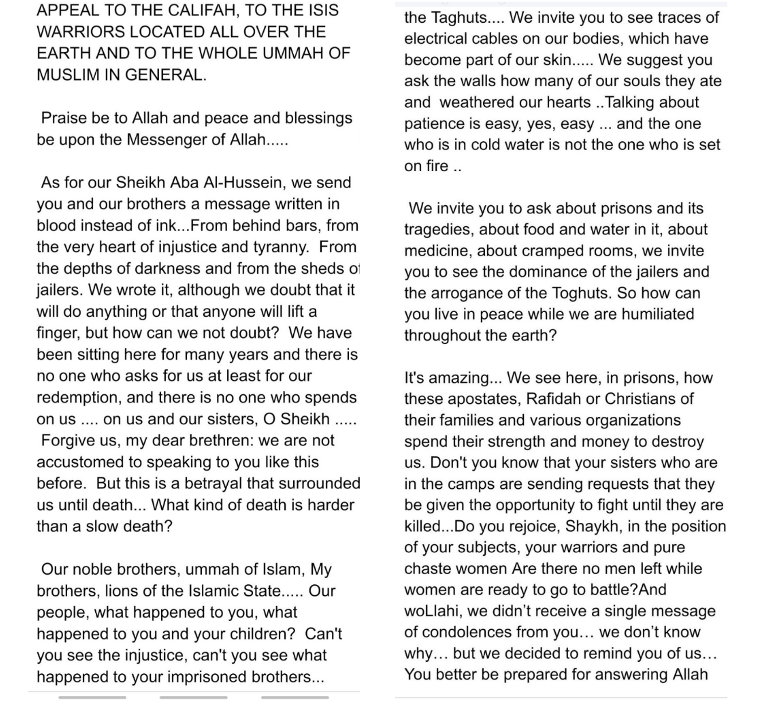
When last year in January the group successfully overran the Al-Sina province freeing many of its comrades, it raised hopes and expectations amongst pro-IS female detainees that they too would finally be freed by their “brothers” putting an end to their “years-long misery” experienced in these camps. Today, however, those expectations have turned into utter dejection and despair as the women turned their attention instead to IS-aligned international support networks from distant geographies who have prioritized their crowdfunding efforts for smuggling adolescents out of Al-Hol as documented by ICSVE’s rigorous monitoring of various IS-linked financial networks. For IS, smuggling their loyalists out has become a tall task owing to the greater financial costs and risks, cases of defraudment, and the greater likelihood of being apprehended by the camp authorities evident through the SDF’s thwarting of numerous escape attempts. The cost for smuggling one family has now grown to $30,000 after the smugglers doubled the amount (which was previously $15,000), this in response to the Internal Security Forces tightening their grip on Al-Hol camp. Nevertheless, planning and these perilous escapes from Al-Hol have allegedly involved many actors like the famous Turkish aid organization Foundation for Humanitarian Aid (IHH), some security forces and vendors who serve the camps who were unable to withstand the temptation of huge bribes, Syrian regime forces and Turkish proxy Syrian National Army for extracting huge profits.
Media reports suggest that human smuggling networks within and outside Al-Hol are primarily operated by IS sleeper cells, allegedly aided by the group’s female loyalists. Some have also unabashedly admitted to facilitating illicit weapons smuggling and carrying out killings on behalf of the group. An IS-affiliated Arabic Telegram channel that shares regular security developments of the Al-Hol and Al-Roj detention camps, potentially managed by admins involved or related to the Al-Hol camp killings, frequently urges women to provide information about SDF security personnel and fake smugglers who swept away with the detainees’ money for carrying out retribution attacks against them. This channel exposes their personal details like phone numbers and bank accounts, intensifying threats against them. Pro-IS admins also issue ultimatums to women detainees against divorcing their incarcerated husbands languishing in the prisons of northeastern Syria along with threatening to kill anyone who encourages, supports or contacts such women who go forward with divorcing their husbands. It appears that the group’s female supporters who are desperate for financial assistance have been helped by the pro-IS admins of the channel on the condition that they stop engaging and co-operating with camp authorities and security guards, reiterating that they are under their constant vigilance. Indeed, ICSVE has heard the same from female detainees in the camps who reference their fear of the long reach of IS global supporters who send reports from outside the camps about anyone inside who gives a media interview or does anything public to disparage the group, often with tent burnings, beatings or other retribution occurring to those who spoke out against IS.
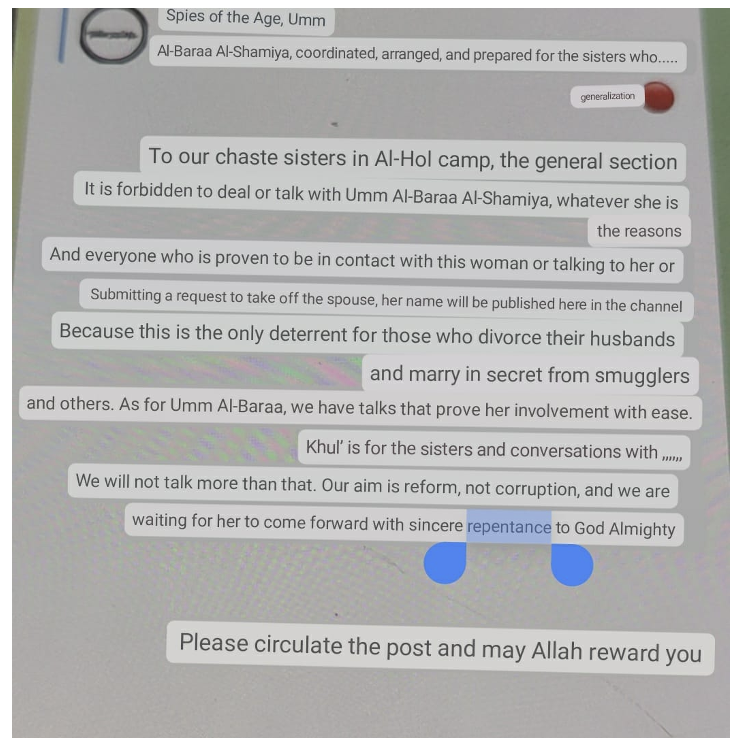
ICSVE’s previous reports have revealed that the IS-linked Russian financial entities closely coordinate their grassroots smuggling efforts with some of the foreign female detainees. Through their widely expanded financial networks across Europe, Asia and Africa they protectively raise and launder funds worth thousands of dollars to spirit these adolescents out of the camp. A recent development in this context is that a Russian network strongly supportive of IS has managed to crowdfund a substantial sum of $35,000 for facilitating the escape of 20 minors, each requiring smuggling cost of $7,000. Most of the money for this fundraiser was funneled through cryptocurrency donations and mobile wallets, predominantly QIWI. Funds can also be routed through PayPal, direct bank transfers, or money transfer services like Western Union and Ria, with the option of also directly handing over the cash to IS financial intermediaries in Austria, Germany and France. They then transfer this sum to various money service businesses and hawala offices in Türkiye from where the funds end up reaching the women in Syria in the form of cash handouts. While Türkiye claims to have shut down a lot of the IS hawala and other support systems in country, IS members shared with ICSVE that once cash reaches Türkiye, financial controls are so porous it is essentially available to IS members in Syria.
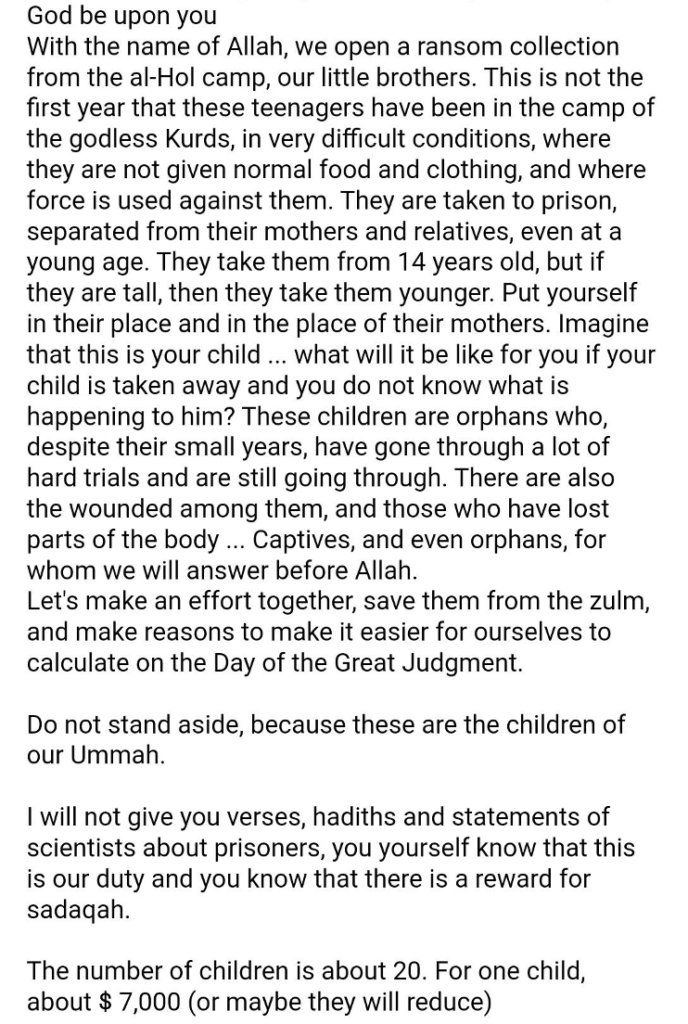

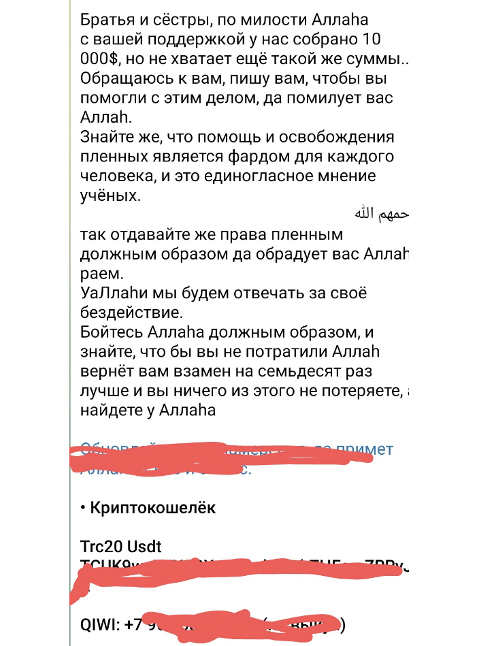
Interestingly, the network’s money collection reports also show how much smuggling capital they have earmarked for different minors. Another IS-linked Russian crowdfunding initiative, “Nuseyba Baghuz,” as per ICSVE’s monitoring, managed to raise $10,000 in three months for a female detainee and her children, utilizing QIWI wallets predominantly. Meanwhile, an Islamic State in Khorasan Province-linked Tajik network (ISKP) said that they won’t be using QIWI due to reduced withdrawal limits, now opting to accept direct bank transfers. A few of the admins of these crowdfunding initiatives also pledged allegiance to new IS caliph Abu Hafs al-Hashimi al-Qurashi with an IS-linked German-language fundraiser sharing translation of IS’s new spokesperson’s speech that confirmed the death of Abu Hussein al-Husseini al-Qurashi.
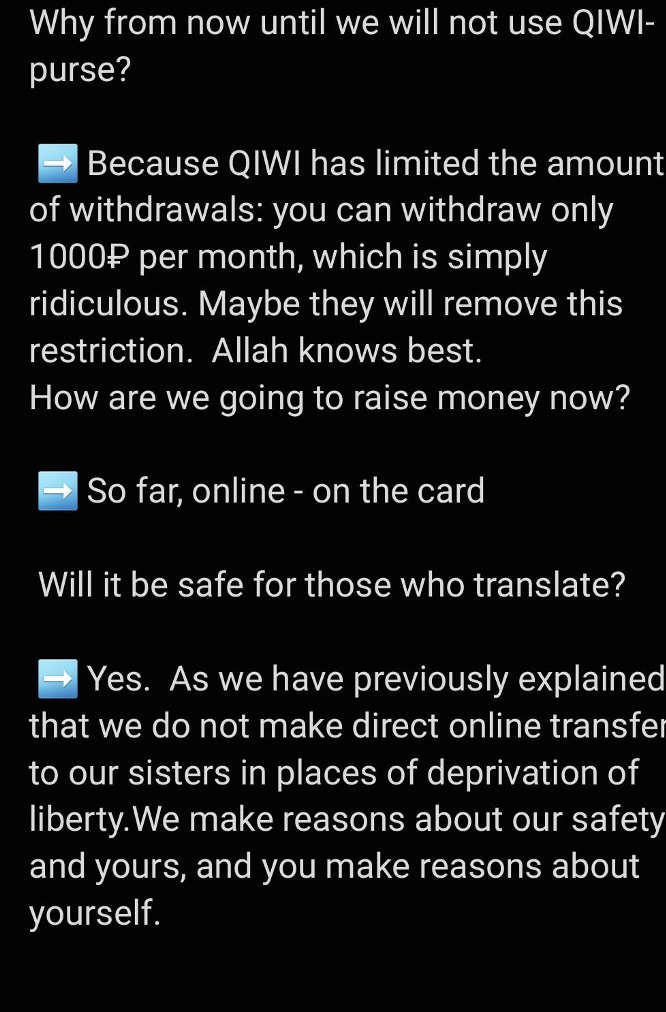
For the Russian and German IS-linked crowdfunding campaigns observed as a part of this study, stable coins like Tether remain the most preferred option to accept crypto donations extolling the benefits of security, privacy, and faster transaction time that these digital currencies have to offer. The organizers of these fundraisers circulated precautionary guides on making safe cryptocurrency transfers. These observations are also reinforced by the findings in the UNSC report that reflect IS’s use of regional versions of cryptocurrency and stable coins along with increasingly using virtual assets like Non-Fungible Tokens for fundraising. IS supporters on the Rocket Chat platform have also been discussing how to send funds to the terror group by using Monero without being detected by law enforcement agencies, with the other users suggesting use of cryptocurrency exchanges and a VPN for obfuscating the transactions. Further, direct payment transfers intended for smuggling out detainees still appear to be made primarily to the beneficiary accounts of the Russian and in most cases Turkish banks, which is not surprising considering that Türkiye has been under intense scrutiny for serving as a haven for IS’s cross-border terror financing. The country has been placed on the Financial Action Task Force’s gray list for its failure to combat global money laundering and funding for terrorist activities with “not pursuing terrorist financing and prioritizing cases of U.N.- designated terrorist organizations such as ISIL and al Qaeda,” As we already discussed exhaustively in our previous reports, financial intermediaries in Germany have also been largely involved in laundering illicit funds for freeing these minors and helping these women detainees. In fact ICSVE in its previous report in 2022 had revealed the role of one of the IS financial facilitators, a Kosovan national, Kujtim B, who was arrested in May 2023 in Germany with seven other suspects for running a financial network that transferred 65,000€ to these women in Syria – in some cases allowing them to escape from detention.
IS supporters from around the world, or those moved by the plight of these women living in deteriorating conditions, assist these IS networks in smuggling these children and some women out of these internment camps.
While countries like France and Canada have stepped forward to repatriate their citizens, especially children, from IS camps in Syria, Australia, Britain, and some other countries are lagging behind in their repatriation efforts. This delay worsens the precarious security situation in dismal detention camps, lacking basic necessities leaving women and children vulnerable to radicalization allowing them to return to support IS. Meanwhile, the women loyal to the terror group aim to achieve IS’s overarching goals of radicalization and recruitment of the children in exchange for financial resources to smuggle the teenage boys out of the camps, later compelling them to fight on the frontlines and die for the terror group. The increasing exposure of children to indoctrination of pro-IS elements, coupled with the pervasive violence, exploitation, and lawlessness in the camps, has significantly impacted the children’s sense of safety, psychological well-being, education, and hopes for the future. This lends credence to the argument for separating these older youth from their mothers, despite the painfulness of such separations, and placing them in rehabilitation centers. As demonstrated above, the constant aggressive efforts of IS through its linked financial networks and loyal supporters help secure the release of its members and children from detention, rearing them as future jihadist fighters carrying substantial security implications for the region and beyond. This is particularly true for those who are Caucasian and who with forged documents may someday slip back into their home countries to mount attacks. The future of such youth depends on taking action now to protect them and us from such fates. Otherwise, we are likely to again face these youth as future soldiers on the battlefield.
The views expressed here are the writers’ and are not necessarily endorsed by Homeland Security Today, which welcomes a broad range of viewpoints in support of securing our homeland. To submit a piece for consideration, email editor @ hstoday.us.
This post was originally published on this site be sure to check out more of their content.






